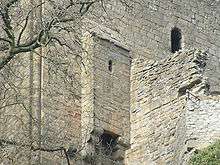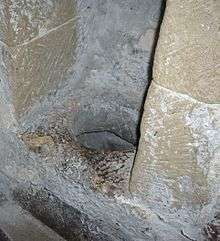Garderobe
Garderobe is a historic term for a room in a medieval castle. The Oxford English Dictionary gives as its first meaning a store-room for valuables, but also acknowledges "by extension, a private room, a bed-chamber; also a privy". Its most common use now is as a term for a castle toilet.

Store room
Garderobe derives from the French word for "wardrobe", a lockable place where clothes and other items are stored. According to medieval architecture scholar Frank Bottomley, garderobes were "Properly, not a latrine or privy but a small room or large cupboard, usually adjoining the chamber [bedroom] or solar [living room] and providing safe-keeping for valuable clothes and other possessions of price: cloth, jewels, spices, plate and money."[1]
Toilet

The term is also used to refer to a medieval or Renaissance toilet or a close stool.[2] In a medieval castle, a garderobe was usually a simple hole discharging to the outside into a cesspit (akin to a pit latrine) or the moat (like a fish pond toilet), depending on the structure of the building. Such toilets were often placed inside a small chamber, leading by association to the use of the term garderobe to describe the rooms. Many can still be seen in Norman and medieval castles and fortifications, for example at Bürresheim Castle in Germany, where three garderobes are still visible.[3] They became obsolete with the introduction of indoor plumbing.
A description of the garderobe at Donegal Castle indicates that while it was in use, it was believed that ammonia would protect visitors' coats and cloaks from moths or fleas.[4]
Other languages
In European public places, a garderobe denotes a cloakroom, wardrobe, alcove, or armoire used to temporarily store the coats and other possessions of visitors.[2] In Danish, Dutch, Estonian, German, Norwegian, Russian, Spanish, Swedish and Ukrainian, the word can mean a cloakroom. In Polish, it means "wardrobe" and in Latvian, it means "checkroom".
See also
References
- Bottomley, Frank. (1983) [1979]. The Castle Explorer's Guide. New York: Avenel Books. p. 70. ISBN 0-517-42172-0. OCLC 9762252.
- Bell, Susan G. (2004). The Lost Tapestries of the City of Ladies. Christine de Pizan's Renaissance Legacy. University of California Press. pp. 38–39. ISBN 0-520-23410-3.
- Bürresheim Castle in the Rhineland-Palatinate state of Germany has three garderobes: "...the rectangular castle keep dating from the 12th century, and raised in height to five storeys in the 15th century ...Only the fifth floor added in the late gothic period has rectangular windows and can be recognized as the dwelling for the tower watchman through its chimney and garderobe." Burgen, Schlösser, Altertümer. Burresheim Castle Koblenz, 2000. p. 22.
- Lane, Megan (5 April 2011). "An Asbo in 14th Century Britain". BBC News. Retrieved 26 May 2020.
The name garderobe – which translates as guarding one's robes – is thought to come from hanging your clothes in the toilet shaft, as the ammonia from the urine would kill the fleas